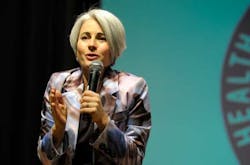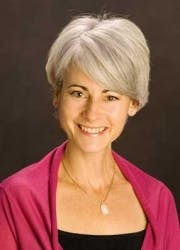Why me?
By Eva Grayzel
“If it doesn’t improve, come back.” I was continually told this at the dental office and the oral surgeon's practice I visited on several occasions over a period of nine (9) months, as the sore on my lateral tongue got bigger.Why was I being asked to determine whether my condition was improving? Living with it everyday, the changes were subtle. If my dental professionals mentioned oral cancer as a possibility, I would have been more proactive as the sore became more painful. After eight months, I developed an unbearable earache, and was treated for water on my eardrum. I returned to the oral surgeon desperate for answers. “Your tongue is small and we don’t want to cut it up unless we have to, but at this point, I guess the next step would be another biopsy.” For the first time, I thought I should look elsewhere for answers.Dr. Mark Urken, chief of Head and Neck Surgery at Mt. Sinai Hospital in NYC, was highly recommended. He felt the enlarged lymph nodes in my neck, looked at the classic ulceration on my lateral tongue, and after doing a minimally invasive procedure, told me I was in an advanced stage of oral cancer. I had a radical neck dissection, a partial glossectomy, and a maximum dose of radiation. I was given a 15% chance of survival. During the thirteen years since my diagnosis, I’ve had three negative biopsies and bilateral vocal chord polyps, but no cancer recurrence. For the rest of my life, I will take synthroid to counter the effect of compromised thyroid function due to radiation. I will only chew on my right side since I can’t feel or taste on the left. I will wake up several times a night with dry mouth. The surgery for dental implants was controversial, but over the years, I have had three molars replaced with implants in my mandible, which was radiated with a maximum dose. Hyperbaric oxygen treatments helped immensely.
Many times I asked myself, “Why me?” A friend gave me an answer: “Why not you?” Now, I tell my story professionally. Visit www.EvaGrayzel.com. It is more than a mission to educate, it is a tribute to those who came before me, and an obligation to those that will follow. Eva’s grassroots oral cancer awareness campaign can be viewed at www.SixStepScreening.org. During radiation, when I was teetering on the tightrope between life and death, I thought good and hard about how I would be remembered. I would not be remembered for taking my children to piano and soccer, but for how I made a difference in the lives of other people. If you can save one life in your entire career by performing oral cancer screenings on everyone, and detecting it early, wouldn’t it be worth it?
Eva Grayzel is a motivational speaker and stage IV survivor of oral cancer. Her story is not uncommon.
Eva Grayzel is an international motivational speaker, author, performer, and cancer survivor.




